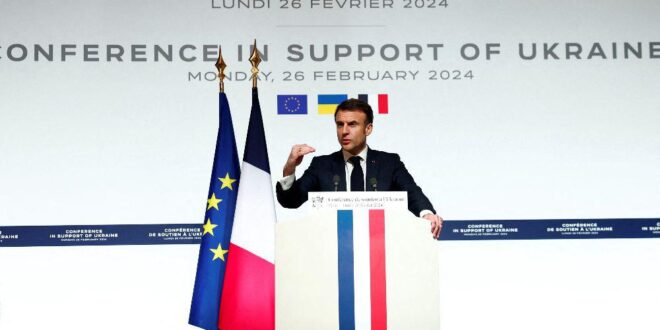France and Central Europe have often stood on opposite sides of European foreign policy debates. But Russia’s war and Donald Trump’s shadow are making their strategic outlooks align.
Russia’s full-scale invasion of Ukraine is reshaping European geopolitics, whether in terms of security dynamics, regional equilibriums, or national foreign policy positions. On the latter, France’s policy shift on Ukraine and Russia is particularly noteworthy.
First, while France had long opposed the geopoliticization of EU and NATO policies toward the Eastern neighborhood, it is now openly embracing and even promoting it. Previously, approaching the post-Soviet space as an object of hard-power competition—as done by the Kremlin or the George W. Bush administration—was seen in Paris as detrimental to these countries’ security and to Europe’s stability and independent agency. More generally, it was dangerous for the EU to pretend to play a geopolitical game without being able or willing to walk the talk.
Now, France is supporting Ukraine’s NATO membership and explicitly conceptualizing EU enlargement to Ukraine and Moldova as a geopolitical tool. Paris has also recently signed a security agreement with Ukraine, a defense partnership with Ukraine, and arms deal with Armenia.
Second, France has abandoned its long-pursued endeavor of building the European security architecture with—and works instead to erect it in deterrence of—Russia. Paris had long wished for Europe to find a modus vivendi with Moscow, in the hopes of defusing tensions on the continent and securing Russia’s cooperation on key international crises. The much-decried and often-caricatured Brégançon initiative launched by the French President in 2019 stemmed from this logic.
While it has now been abandoned, some of the letter of and thinking behind this initiative—an attempt at diplomacy in its traditional sense—has seemingly been transferred to the European Political Community. Except that this framework conspicuously excludes Russia.
Several factors explain this reorientation in French policies. The first has to do with the magnitude and consequences of Russia’s war of aggression against Ukraine. It was also the realization that there would be no quick negotiated settlement in what became a war of attrition where Russia doubled down. The shift in the French president’s rhetoric can in fact be traced back to late 2022 and early 2023. In this context, anchoring Ukraine in Western collective defense structures such as NATO is now regarded in Paris as the most efficient and most cost-effective solution to guarantee Ukraine’s security and prevent future conflicts.
More profoundly, though, Macron’s new stance needs to be read in conjunction with his long-standing agenda on European sovereignty. In the face of Russia’s threat, he sees a necessity, and maybe an opportunity, to strengthen strategic unity and solidarity across the EU and NATO, to affirm Europe as a strong and autonomous geopolitical actor, and to prop up French leadership in this context. All these were on full display at the Paris conference on Ukraine of February 26, where Macron tried again to place himself ahead if the curve with headline-grabbing declarations intended to demonstrate Europe’s resolve. This starkly contrasts with Germany’s more cautious attitude.
But can France emerge as a leader in Europe’s strategic posture with regard to Russia? Central Europe stands out as a useful echo chamber to test how France’s policy shift and European agenda resonate with other EU member states. Countries like Poland, the Baltic states or, more intermittently, Czechia had been vehemently critical of Macron’s Russia initiatives and deeply skeptical of his push for European strategic autonomy. The above-described changes bring France much closer to their own positions and were in fact partially articulated with reference to their own region, as illustrated by Macron’s landmark speech in Bratislava. Does this then change how they view French ideas on European strategic autonomy?
In a recent study conducted for the Visegrad Fund and Prague Institute of International Relations, I found that Central European diplomats and experts converge in noting a real, “profound,” and “impressive” change in France’s policies toward Ukraine and Russia—but also toward their own region. Some do raise questions about the durability of that change, noting that more time and deeds will be needed. But many also noted deeply rooted “mistrust” grounded in “stereotypical views” of France, fed by years of mutual neglect. Misunderstandings and mutual suspicions clearly persist on the role of the United States in Europe. Not least as Central Europe and France sometimes seem stuck in images of each other dating back to the Iraq crisis of the early 2000s.
Just like Gaullism in France, Atlanticism in Central Europe partially crystallized as an ideology. This was apparent, for instance, in refusals to see and adapt to U.S. foreign policy as it was—such as the downplaying of Trump’s denunciation of NATO as “obsolete”—or in the knee-jerk reactions to the very notion of strategic autonomy.
But the changing parameters of European geopolitics brings France and Central Europe closer on transatlantic relations as well. Paris has long made clear that what it means by European strategic autonomy is above all a European pillar inside NATO—something that many Central European leaders endorse. Opposing NATO and the EU and seeing their relationship as a negative-sum game is so 2003. Few Europeans think in these terms today.
The acuity of the threat posed by Russia also lead Central European foreign policy elites to look anew at the EU as a defense actor and, to some extent, even at European strategic autonomy. As an official from the region put it to me, “whether you like it or not, Macron is one of the few European leaders that thinks in geopolitical terms.” Some others remain unconvinced, however, and indicate that the changes in France’s policies do not make them reconsider its proposals in this regard. The question is whether the prospect of Trump’s return to the White House might, not least considering his recent declarations on NATO and implicit invitation to Russia to do “what the hell it wants” with European states that are not “paying.”
Central Europe’s warming up to the idea of strategic autonomy is not as clear-cut as France’s newfound readiness to build it against Russia. But both go in the same direction of bolstering Europe’s geopolitical actorness.
 Eurasia Press & News
Eurasia Press & News



